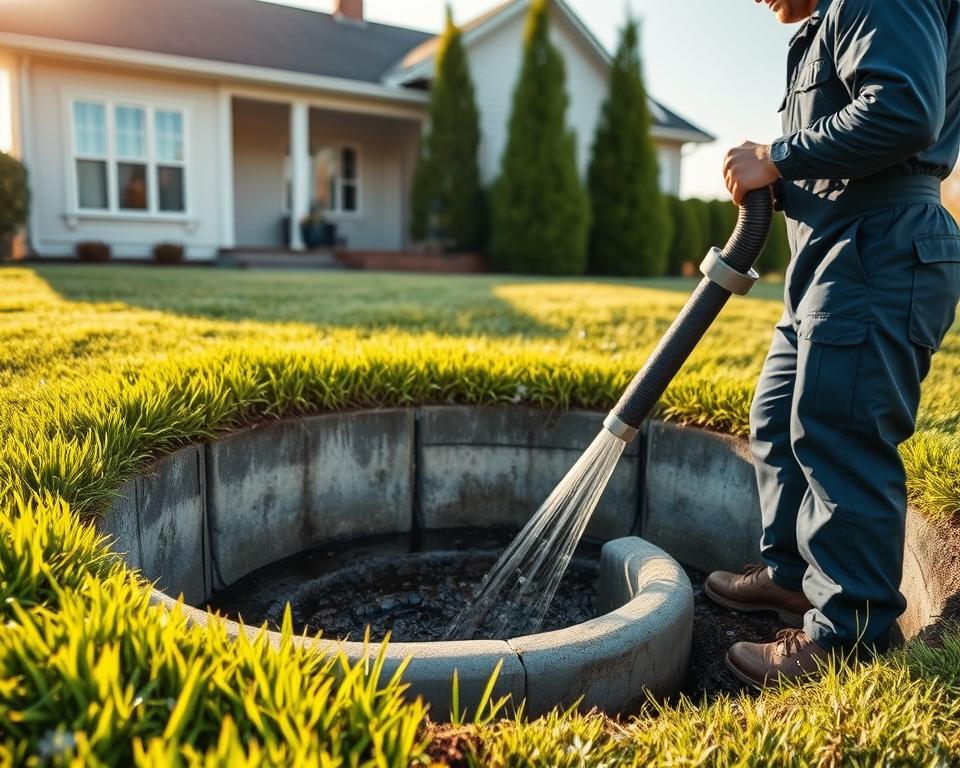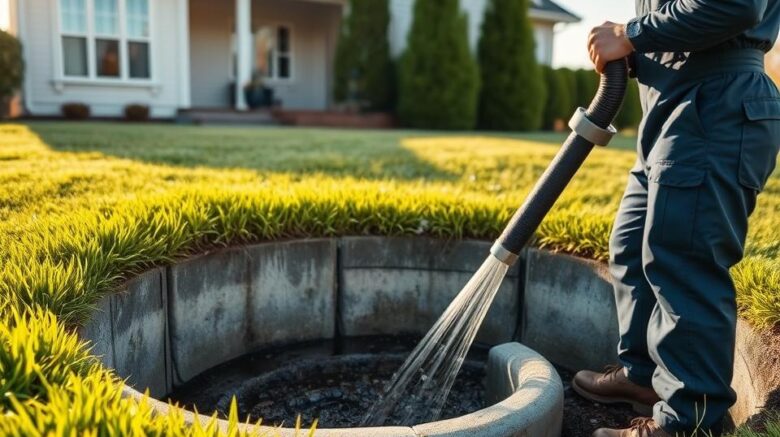Preserve Septic System Cleaning for Tank Health
Ever thought regarding the consequences of ignoring septic system care? For homeowners relying on these installations for waste management, foregoing scheduled care can cause hefty expenses. It also creates hazards to both health and the surroundings. Pumping your septic system is more than a simple task; it’s essential for making sure your household functions reliably. By regularly clearing out your septic tank, you prevent solid waste collection and prolong the service life of your unit. This proactive stance lets you avoid any unwanted events. Discover the value of septic tank upkeep and the steps entailed with septic system inspection.
Essential Points
- Regular septic system servicing is vital for preventing hefty repairs.
- Ignoring maintenance can lead to health hazards for your loved ones.
- Knowing your septic system assists in proper stewardship.
- Symptoms of a troubled septic system should be identified early.
- Licensed technicians can assist in keeping excellent tank health.
Grasping Your Septic System
A septic system is an economical in‑situ method for processing wastewater. It mainly consists of two components: the septic tank and the leachfield. Both are essential for providing adequate purification and protecting the surroundings.
The septic tank collects wastewater from your home. Inside,, waste solids drop to the floor, and fluids rise to the surface. Beneficial microbes within the tank decompose the organic material, making the effluent more manageable to handle. This partially treated wastewater then moves to the drainfield for additional filtering by the ground, finishing the cleanup.
It’s crucial for homeowners to appreciate the mechanics of their septic system. Grasping how the septic tank and drainfield function in tandem can lead to enhanced system care. This insight promotes proper maintenance methods, helping guarantee the system’s durability.

Value of Routine Septic System Cleaning
Routine maintenance of the septic system is key for domestic and environmental health. If ignored, unprocessed wastewater can seep into your yard. This escape may result in subsurface water contamination, introducing health hazards. By maintaining the septic system clean, you safeguard your loved ones and the community.
It’s advised to service the septic system every 3‑5 years, based on how much you load it. Such care is not just eco‑friendly; it avoids costly fixes. A septic system that’s well‑maintained operates better, providing a safer home environment and a safer ecosystem.
Indicators Your Septic Tank Needs Attention
Homeowners need to recognize clues that their septic tank may need cleaning. Common symptoms to monitor include:
- Slow draining in basins, baths, and toilets
- Unpleasant smells near the drainfield
- Wastewater returns in interior drains
- Prolonged soggy spots or overly green sections of grass over the septic system
It’s critical to spot these symptoms promptly to avert major septic tank issues. Routine inspections are vital. They detect issues before they escalate to expensive fixes. Checking your system periodically ensures it functions well and survives longer.
Keeping watch and acting swiftly are essential for septic system upkeep. By observing these alerts, you can maintain your septic system in optimal health.
Septic System Pumping Intervals
Pumping your septic system regularly is central to ensuring your home’s plumbing in top shape. Professionals usually suggest servicing the septic tank every three to five years. However, this can vary based on the number of your family, how much water is consumed, and the volume of your tank.
If you have a big household that consumes more water, you could need to pump the system more often. Tracking your water usage can help you figure out if you need to adjust your pumping schedule.
All in Sanitation encourages setting up a steady pumping schedule that matches your household’s unique needs. Following a routine maintenance program helps keep your septic system functioning smoothly and prevents hefty restorations.
Septic System Cleaning: Top Tips
For a septic system to remain sound, homeowners must follow crucial habits. It’s essential not to dispose of non‑biodegradable items; doing so prevents obstructions and keeps the system running smoothly. Similarly, minimizing harsh chemicals preserves the required bacterial ecosystem. These steps are critical for the system’s durability and effectiveness.
Proactivity with routine inspections is crucial. Scheduling regular inspections can detect issues promptly, allowing for prompt repairs. Additionally, conserving water through fixing leaks and careful usage aids septic tank health. These measures guarantee the system runs effectively for a long time.
It’s also essential not to place heavy loads on the absorption area. Keeping this area unobstructed allows it adequately handle effluent, safeguarding your system from damage. Following advice from professionals like All in Sanitation also boosts septic system care.
The Steps of Septic Tank Pumping
For homeowners, understanding the septic system cleaning process is crucial. A licensed septic pumper should perform regular septic tank pumping to ensure your system functioning efficiently. The first step is assessing the tank’s status to decide when it requires pumping.
A septic tank demands pumping once the solid layer take up about a third to 50 percent of its capacity. The licensed septic pumper will then clear out these accumulations. This procedure keeps the system’s effectiveness. Furthermore, the appointment may entail examining the tank for possible issues, facilitating prompt fixes.
Holding a journal of each pumping session is advisable. This log helps homeowners keep tabs on their septic system’s maintenance, and is useful if listing the property. Regular septic system maintenance improves its life span and reliability, preventing hefty fixes down the line.
Septic Tank Check‑Up: What to Examine
Routine inspections are essential for your septic system’s condition. Using a thorough septic tank inspection checklist can detect potential issues before they worsen. Inspections should be done by a qualified technician every one‑to‑two years. They will assess solid depth and the floating layer during this time.
Checking the baffles and filters is also vital. These parts are essential for your septic system’s smooth operation. Detecting leaks or failures quickly can avoid large repair costs. Proactive steps, like following an inspection checklist, enhance your system’s longevity and performance.
Specialized Septic System Services
Utilizing specialized septic system services is essential for your septic system’s health. By selecting a company like All in Sanitation, you ensure that experts take care of the pumping, inspections, and repairs carefully. Accredited technicians have specialized knowledge, enabling homeowners to sustain the system’s optimal functionality long‑term.
Servicing by certified technicians reduces the chance of sudden breakdowns and expensive restorations. These services feature in‑depth inspections that assess the system’s condition, pinpointing possible issues promptly. Adopting this proactive stance substantially prolongs your septic system’s service years.
Ultimately, entrusting your septic system to certified pros offers confidence. Collaborating with companies such as All in Sanitation taps into their know‑how. It guarantees the integrity of your tank, building trust in its maintenance.
Septic System Maintenance Advice for Homeowners
Homeowners have the ability to keep their septic systems running efficiently. Applying efficient care strategies greatly enhances their function. Implementing easy changes to how we use water, like cutting down on extra use and spreading the use of appliances, decreases strain on the system.
Adding low‑flow fixtures in your bathrooms and kitchens noticeably bolsters septic longevity. These fixtures cut down water use without sacrificing performance. Avoiding garbage disposals is smart too, as they lead to more solids in the system, requiring more frequent upkeep.
Regular inspections and adhering to a proper maintenance plan will lengthen your septic system’s life. Staying aware of everything that enters your drains is essential for keeping a robust septic environment. By practicing these habits, you’ll greatly boost your septic system’s functionality and lifespan.
Common Septic System Repairs
Septic systems may face various problems over time, necessitating repairs. Frequent faults involve fluid loss, damaged baffles, and percolation troubles in the absorption area. By identifying the signs at an early stage, homeowners can resolve them rapidly, keeping their system is in sound condition.
Standard repairs include:
- Replacing faulty components to restore system integrity
- Fixing or changing cracked conduits to stop leaks
- Removing obstructions from clogged lines to maintain proper drainage
Handling septic issues swiftly not only lowers outlays over time but also prolongs the system’s service years. Scheduled check‑ups and maintenance can help prevent these complications, contributing to the maintenance of a robust septic system.
As a Final Point
Maintaining your septic system robust is key to ecological and personal well‑being. Regular pumpings and check‑ups prevent costly fixes and dangers. Taking initiative with septic care protects time and reduces concern.
Employing professionals like All in Sanitation ensures high‑quality upkeep adapted to your system. Their experience helps spot issues early, avoiding major troubles and emphasizing the need for scheduled inspections.
Practicing best practices for septic maintenance delivers long‑term system effectiveness. A bit of maintenance in the present ensures a better‑functioning septic system in the long run.
